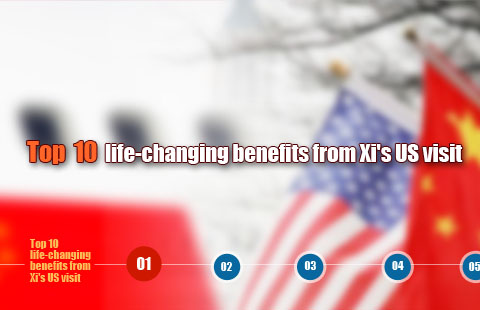Global growth forecast lowered
Updated: 2015-10-07 10:49
By Chen Weihua in New York(China Daily)
|
|||||||||
The International Monetary Fund has lowered its forecast for global growth for 2015 and warned of the possible impact of China's positive economic transformation.
The IMF, in its World Economic Outlook report released on Tuesday, projected the global economy to grow 3.1 percent, compared with the 3.3 percent in its July forecast.
Compared with last year, the recovery in advanced economies is expected to pick up slightly, while activity in emerging market and developing economies is projected to slow for the fifth year in a row, according to the report.
The report warned that the downside risks to the outlook have risen, particularly for emerging market and developing economies in an environment of declining commodity prices, reduced capital flow to emerging markets and pressure on their currencies and increased financial market volatility.
While the growth slowdown in China so far is in line with forecasts, its cross-border repercussions appear greater than previously envisaged, the report said.
The Chinese government has described its economic slowdown as a new normal as the country transitions from export- and investment-led growth to a consumption-driven, more sustainable and more environmentally friendly economy.
"This process, however necessary and healthy in the longer run, has near-term implications for China's growth and its relations with its trade partners," Maurice Obstfeld, IMF's economic counsellor, wrote on IMF's website on Tuesday.
The report said China's growth is projected to slow further, albeit gradually.
The IMF has forecast a 6.8 percent growth for China for 2015, still much higher than the global average and given the much larger size of the Chinese economy compared with the previous decades of double-digit growth. The Chinese economy grew 7.4 percent in 2014.
Changyong Rhee, director of IMF's Asia and Pacific department, wrote on the IMF website on Monday that it is important to understand that the transition that is essential in China is to create a more inclusive economy that gives greater play to market forces and achieves safer and more sustainable growth.
"This will involve a delicate balancing act for the Chinese government - implementing reforms while maintaining demand and financial stability," he wrote.
According to Rhee, developments in China's real economy so far provide some comfort that the transition can be managed. 'China has adequate policy space should further policy stimulus become necessary to prevent growth from falling excessively,' he wrote.
Rhee believes it would be preferable to avoid the renewed use of debt-financed investment so as to prevent a resurgence of corporate leveraging. Growth in China since the global financial crisis has relied heavily on investment and credit, with much of this going to state-owned firms and the real estate sector.
'This created growing vulnerabilities which, while still manageable, cannot continue to accumulate,' he said.
The IMF estimates that a one percentage point slowdown in Chinese growth translates into a 0.3 percent decline for other Asian countries.
'China's transition could provide the basis for renewed economic strength in a region that has led the world in growth for several years,' Rhee said.
Chinese President Xi Jinping pledged continued market-oriented reforms and an open and fair market in his speech in Seattle, Washington, on Sept 22.
chenweihua@chinadailyusa.com
- Russian warplanes hit IS targets in Syria
- Senior US envoy to visit Japan, S Korea, China
- Russia, US agree to cooperate in solving Syria crisis: Russian FM
- Iranian President calls Iran deal victory over war
- LatAm experts praise Xi on yuan, globalization
- Evidence found of summertime water flows on Mars: study

 China wins first Nobel in medicine
China wins first Nobel in medicine-
 Gary Locke: Candor key to relations
Gary Locke: Candor key to relations -
 Saving Chinese folk songs
Saving Chinese folk songs 
 Candlelight vigil for Oregon shooting victims
Candlelight vigil for Oregon shooting victims
 Chinese people's pursuits in different eras
Chinese people's pursuits in different eras
 Ten highlights from Xi's trip to US and UN
Ten highlights from Xi's trip to US and UN
 Top 10 life-changing benefits from Xi's US visit
Top 10 life-changing benefits from Xi's US visit-
 Highlights of President Xi's speeches at UN
Highlights of President Xi's speeches at UN
Most Viewed
Editor's Picks

|

|

|

|

|

|
Today's Top News
Tu first Chinese to win Nobel Prize in Medicine
Huntsman says Sino-US relationship needs common goals
Xi pledges $2 billion to help developing countries
Young people from US look forward to Xi's state visit: Survey
US to accept more refugees than planned
Li calls on State-owned firms to tap more global markets
Apple's iOS App Store suffers first major attack
Japan enacts new security laws to overturn postwar pacifism
US Weekly

|

|








